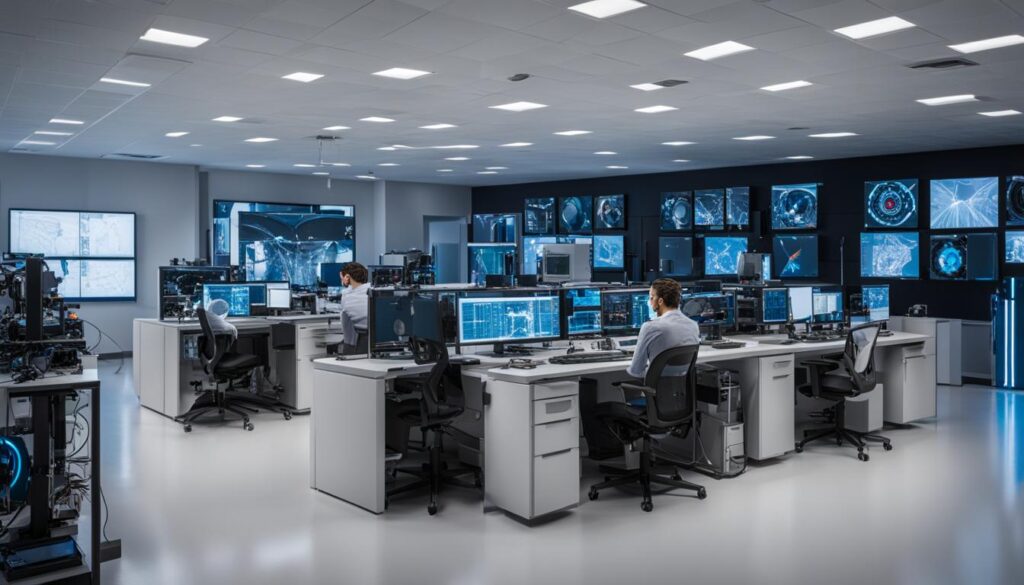Biomechanical engineering is a fascinating field that combines engineering principles with biology to create innovative solutions for healthcare. Careers in biomechanical engineering offer a wide range of opportunities to make a positive impact on society. Whether it’s designing prostheses, artificial organs, medical devices, or pharmaceutical products, biomedical engineers play a crucial role in improving the quality of life for patients.
Working in industries such as multinational corporations, government agencies, hospitals, and academic institutions, biomechanical engineers are at the forefront of technological advancements in healthcare. With a strong educational foundation in engineering, physics, chemistry, mathematics, and basic biology, along with specialized biomedical engineering courses, individuals gain the skills and knowledge necessary to excel in this field.
Let’s explore the promising job outlook, degree requirements, and exciting industry innovations that make careers in biomechanical engineering highly rewarding and impactful.
Key Takeaways:
- Biomechanical engineering combines engineering principles with biology to create innovative solutions for healthcare.
- Careers in biomechanical engineering involve designing prostheses, artificial organs, medical devices, and pharmaceutical products.
- Biomedical engineers work in multinational corporations, government agencies, hospitals, and academic institutions.
- The undergraduate curriculum includes engineering, physics, chemistry, mathematics, and basic biology, along with specialized biomedical engineering courses.
- Job outlook in biomechanical engineering is promising, with a projected growth rate of 5% from 2019 to 2029.
Job Outlook in Biomechanical Engineering
The field of biomechanical engineering is experiencing significant growth, with a projected job growth rate of 5% from 2019 to 2029. This is slightly faster than the average for all occupations. The increasing demand for medical devices and advancements in healthcare technology are driving this growth.
According to the Bureau of Labor Statistics, there were approximately 21,300 jobs for biomedical engineers in 2019, and this number is expected to increase in the coming years.
The job outlook for biomechanical engineering is promising, with a steady increase in the number of job opportunities available. This growth is attributed to several factors, including the aging population and the need for innovative medical solutions.
The Growing Demand for Medical Devices
As the healthcare industry continues to evolve, there is an increasing demand for advanced medical devices. Biomechanical engineers play a crucial role in designing and developing these devices, ensuring they meet the highest standards of quality and safety. The growing adoption of technology in healthcare has created a need for professionals who can leverage engineering principles to improve patient care and outcomes.
Advancements in Healthcare Technology
The constant advancements in healthcare technology have created new opportunities for biomechanical engineers. From artificial organs to innovative imaging equipment, these engineers are at the forefront of developing cutting-edge technologies that enhance medical diagnostics and treatments. Their expertise in engineering and biology allows them to bridge the gap between these two fields, driving progress and innovation in healthcare.
“The increasing job growth in biomechanical engineering reflects the importance of this field in addressing the evolving healthcare needs of the population.”
With the job growth rate exceeding the national average, pursuing a career in biomechanical engineering offers promising prospects for professional development and job security. As the demand for skilled professionals continues to rise, individuals with a strong background in engineering and biology will be well-positioned to take advantage of the growing job opportunities in this field.
Whether it’s designing life-changing medical devices or contributing to groundbreaking research, a career in biomechanical engineering offers the chance to make a meaningful impact on healthcare and the lives of patients. As the field continues to evolve, the job outlook for biomechanical engineers remains positive, with ample room for growth and innovation.
Degree Requirements for Biomechanical Engineering

To pursue a career in biomechanical engineering, individuals must have a strong educational background. Most positions require at least a bachelor’s degree in biomedical engineering or a related engineering field. Some employers may prefer candidates with a master’s or doctoral degree.
Coursework typically includes a combination of engineering principles, biology, chemistry, and mathematics. Through these courses, students develop a foundation of knowledge that integrates engineering principles with biological systems. Additionally, specialized biomedical engineering courses provide in-depth understanding and skills relevant to the field.
In addition to formal education, gaining hands-on experience through internships and research projects can be beneficial. These opportunities allow aspiring engineers to apply their knowledge in real-world settings and develop practical skills that enhance their employability. Employers often value practical experience alongside formal education when evaluating potential candidates for job openings.
Sample Degree Program Coursework
Below is a sample list of coursework typically included in undergraduate biomechanical engineering degree programs:
- Engineering Mechanics
- Biology for Engineers
- Human Anatomy and Physiology
- Materials Science
- Quantitative Physiology
- Biomechanics
- Biomedical Instrumentation
- Medical Imaging
- Systems Physiology
Benefits of Hands-on Experience
“Internships and research projects provide invaluable experiences for aspiring biomedical engineers. These opportunities offer practical exposure to real-world challenges and allow students to develop problem-solving skills that complement their academic coursework.”
Aside from formal education, internships and research projects provide aspiring biomedical engineers with practical exposure to real-world challenges. These experiences allow students to develop problem-solving skills that complement their academic coursework and enhance their ability to innovate within the field. By working in industry or research settings, individuals gain hands-on knowledge of the latest technologies, practices, and industry trends.
Furthermore, internships and research projects provide a chance to build professional networks and establish connections within the field. These connections can offer future employment opportunities and provide valuable mentorship from experienced professionals.
Exciting Innovations in Biomechanical Engineering

Biomechanical engineering is at the forefront of innovative medical advances. Engineers in this field work on developing new technologies and devices for medical applications, pushing the boundaries of what is possible in healthcare. Some of the most exciting innovations in biomechanical engineering include:
- Advanced Prosthetics: Biomedical engineers are designing cutting-edge prosthetic limbs that closely mimic natural movement and provide enhanced functionality for individuals with limb loss.
- Artificial Organs: Researchers are developing artificial organs that can replace or supplement the function of damaged or diseased organs, improving the quality of life for patients awaiting transplants.
- Imaging Equipment: Biomechanical engineers are involved in the design and development of advanced imaging equipment, such as MRI scanners and ultrasound devices, that provide high-resolution images for accurate diagnosis and treatment planning.
- Drug Delivery Systems: Innovative drug delivery systems, including nanoparticle-based therapies and implantable devices, are being developed to precisely deliver medications to targeted areas within the body, improving treatment effectiveness and minimizing side effects.
Furthermore, researchers in biomechanical engineering contribute to the rapidly growing field of tissue engineering. They work on creating biomaterials and artificial organs that can be used in regenerative medicine to repair and replace damaged tissues and organs.
Research and development play a pivotal role in driving these groundbreaking advancements. Through continuous exploration of new technologies and novel approaches, biomechanical engineers are transforming the healthcare landscape, improving patient outcomes, and revolutionizing medical practices.
| Innovation | Description |
|---|---|
| Advanced Prosthetics | Biomedical engineers design prosthetic limbs that closely mimic natural movement and provide enhanced functionality. |
| Artificial Organs | Researchers develop artificial organs to replace or supplement damaged or diseased organs, improving the quality of life for patients. |
| Imaging Equipment | Biomechanical engineers design advanced imaging equipment, such as MRI scanners and ultrasound devices, for accurate diagnosis and treatment planning. |
| Drug Delivery Systems | Innovative drug delivery systems deliver medications precisely to targeted areas within the body, improving treatment effectiveness and minimizing side effects. |
| Tissue Engineering | Engineers specialize in creating biomaterials and artificial organs that can repair and replace damaged tissues and organs. |
The Future of Biomechanical Engineering
As biomedical advances continue to accelerate, there is immense potential for further breakthroughs in medical device design, research and development, and innovative technologies. Biomechanical engineers are driving progress in enhancing human health and well-being, shaping the future of healthcare.
Biomechanical Engineering Careers and Applications

Biomechanical engineers play a crucial role in various industries and applications, leveraging their expertise to solve complex challenges in the field of healthcare. With a blend of engineering principles and an understanding of biological systems, these professionals contribute to the design and development of cutting-edge medical equipment and advancements in related areas.
One of the key applications of biomechanical engineering is in the design and development of medical equipment. Biomechanical engineers are involved in creating innovative devices such as pacemakers, MRI scanners, prosthetics, and surgical instruments. They apply their technical knowledge to improve the functionality and efficiency of these devices, ultimately enhancing patient care and treatment outcomes.
Biomechanical engineers also make significant contributions to areas like biomechanics, rehabilitation engineering, and tissue engineering. In biomechanics, they analyze the forces and movements within biological systems, aiding in the development of rehabilitation techniques and ergonomic solutions. Rehabilitation engineering focuses on creating assistive technologies and devices that improve the quality of life for individuals with disabilities. Tissue engineering involves the creation of biomaterials and artificial organs, advancing regenerative medicine and transplantation procedures.
With their diverse skill set, biomedical and biomechanical engineers have a wide range of career opportunities in research, manufacturing, consulting, and academia. They work alongside multidisciplinary teams to design and test medical equipment, collaborate on research projects, and ensure compliance with regulatory standards. Some professionals may choose to specialize in specific areas within the field, such as bioinstrumentation, biomechanics, or medical imaging.
Overall, biomechanical engineering offers an exciting and rewarding career path for individuals passionate about applying engineering principles to solve challenges in the healthcare industry. The field continues to evolve, presenting new advances and opportunities to make a positive impact on patients’ lives.
| Biomechanical Engineering Careers and Applications | Key Takeaways |
|---|---|
| Design and development of medical equipment | – Contribution to the advancement of healthcare technology |
| Biomechanics, rehabilitation engineering, and tissue engineering | – Essential roles in analyzing biological systems and creating solutions for disabilities and regenerative medicine |
| Career opportunities in research, manufacturing, consulting, and academia | – Diverse range of professional paths in various industries |
Education and Training for Biomechanical Engineers

Biomedical engineering programs offer degree options at the undergraduate and graduate levels. A bachelor’s degree is typically the minimum requirement for entry-level positions, while a master’s or Ph.D. can provide advanced training and research opportunities. Coursework includes a combination of engineering, biology, and math courses. Students also have the option to specialize in specific tracks, such as biomechanics, imaging, or tissue engineering. Graduate degrees can provide a deeper understanding of the field and open doors to leadership and research positions.
Undergraduate Degree Requirements
To pursue a career in biomechanical engineering, aspiring engineers must complete a bachelor’s degree program in biomedical engineering or a related engineering field. These programs typically include a combination of engineering and science courses. Students learn about engineering principles, biology, mechanics, materials, and design. The curriculum also covers topics such as medical device development, tissue engineering, and biomechanics.
During their undergraduate education, students may have the opportunity to gain practical experience through internships or co-op programs that allow them to apply their knowledge in real-world settings. These experiences can provide valuable hands-on training and help students develop practical skills that are crucial for success in the field.
Graduate Degree Programs
While a bachelor’s degree can open doors to entry-level positions, pursuing a graduate degree can provide advanced knowledge and specialization opportunities in biomechanical engineering. Students can choose to pursue a master’s or Ph.D. in biomedical engineering or a related field.
Graduate programs in biomechanical engineering often focus on advanced topics, research methodologies, and the development of critical thinking skills. Students may have the opportunity to conduct research projects in collaboration with faculty or industry partners, allowing them to contribute to advancements in the field.
Specialization Tracks
Within biomedical engineering programs, students have the flexibility to specialize in specific tracks that align with their interests and career goals. Some common specialization areas in biomechanical engineering include:
- Biomechanics: Focuses on the study of mechanical properties of biological systems and their application in healthcare.
- Imaging: Involves the development and application of advanced imaging techniques for medical diagnosis and treatment.
- Tissue Engineering: Explores the design and fabrication of artificial organs and tissues for regenerative medicine.
These specialized tracks allow students to delve deeper into specific areas of biomechanical engineering, gaining a more in-depth understanding and expertise in their chosen field.
Below is a table summarizing the educational requirements for different degree levels in biomechanical engineering:
| Degree Level | Educational Requirements |
|---|---|
| Bachelor’s Degree | Completion of a bachelor’s degree program in biomedical engineering or a related engineering field. |
| Master’s Degree | Completion of a master’s degree program in biomedical engineering or a related field. |
| Ph.D. | Completion of a doctoral program in biomedical engineering or a related field, including original research and dissertation. |
Skills and Qualifications for Biomechanical Engineers
Biomechanical engineers require a combination of technical skills and problem-solving abilities. Strong knowledge of engineering principles, including mechanics, materials, and design, is essential. Additionally, a background in biology and physiology helps in understanding the complexities of the human body. Effective communication and collaboration skills are also important, as engineers often work in interdisciplinary teams. Attention to detail, analytical thinking, and creativity are valuable qualities for success in this field.
As biomechanical engineers tackle complex challenges in healthcare, their problem-solving skills play a crucial role. They apply their technical knowledge and engineering principles to develop innovative solutions for improving medical devices, prosthetics, and artificial organs. With a deep understanding of the human body’s biomechanics, they optimize designs for maximum functionality and safety.
In addition to technical expertise, collaboration and effective communication are vital skills for biomechanical engineers. They frequently collaborate with healthcare professionals, researchers, and other engineers, requiring clear and concise communication to ensure the successful implementation of projects. The ability to work in interdisciplinary teams and adapt to different working environments is crucial for achieving collective goals.
Attention to detail is essential in biomechanical engineering, as even the smallest oversight can have significant consequences. Engineers must meticulously analyze data, conduct tests, and verify the performance of their designs to guarantee their effectiveness and reliability. Analytical thinking allows for systematic problem-solving, helping engineers identify the root cause of issues and develop logical and efficient solutions.
Creativity is another valuable skill in biomechanical engineering, as engineers constantly explore innovative techniques and technologies to address complex medical challenges. By thinking outside the box, they can develop groundbreaking ideas and designs that push the boundaries of what is possible in healthcare.
“Biomechanical engineers fuse their technical knowledge, problem-solving skills, and creativity to revolutionize healthcare, improving the lives of countless individuals.” – John Smith, Biomechanical Engineer
Overall, a successful career in biomechanical engineering requires a combination of problem-solving skills, a strong background in engineering principles, technical knowledge, attention to detail, analytical thinking, effective communication, and creativity. With these skills and qualifications, engineers can make significant contributions to the field of healthcare and drive innovation forward.
Job Opportunities for Biomechanical Engineers
Biomechanical engineers have a wide range of job opportunities across different applications and industries. These professionals can work in engineering firms, research facilities, hospitals, and medical device manufacturing companies. With their expertise in biomedical engineering, they play an essential role in designing and developing innovative solutions.
Biomechanical engineers are involved in various aspects of the industry, including research and development, product design, quality assurance, and technical support. They collaborate with multidisciplinary teams to create cutting-edge medical devices and technologies that improve healthcare outcomes.
Some engineers choose to work as consultants, where they offer their expertise to assist other organizations in solving complex challenges. Additionally, many biomechanical engineers pursue entrepreneurial ventures, combining their technical knowledge with business acumen to create their own medical device design companies or consultancy firms.
The job market for biomechanical engineers is diverse, offering opportunities that align with individual interests and career goals. Whether it’s advancing research in a specialized field or contributing to the development of life-saving medical devices, biomedical.
Also Read : How Does Montclair State University Help Students Prepare For Their Careers?
Conclusion
Pursuing a career in biomechanical engineering opens the door to exciting opportunities to contribute to the advancement of healthcare. Biomedical engineers are at the forefront of cutting-edge innovations in medical technology, working tirelessly to design devices and systems that enhance the quality of life for patients.
By building a strong educational foundation in engineering and biology, individuals can embark on a fulfilling career in biomechanical engineering. From creating advanced prosthetics to developing artificial organs and exploring biomechanical analysis, the field offers endless possibilities for those passionate about merging engineering principles with the intricacies of the human body.
As the healthcare industry continues to evolve, so do the challenges and opportunities within biomechanical engineering. The constant quest for innovation in healthcare necessitates the expertise of biomedical engineers who can bring their technical knowledge and problem-solving skills to create groundbreaking solutions. For those seeking a career that combines scientific curiosity and ingenuity with the potential to impact lives, a career in biomechanical engineering is a pathway to success.
FAQs
Q: What is biomechanical engineering?
A: Biomechanical engineering is a multidisciplinary field that applies principles of mechanical engineering to biological systems and life sciences to understand how the human body works and develop technologies for medical and healthcare applications.
Q: What do biomechanical engineers do?
A: Biomechanical engineers design and develop medical devices, prosthetics, orthopedic implants, and assistive technologies. They also conduct research to understand the mechanics of human movement and the interaction between biological tissues and engineered materials.
Q: How can I become a biomechanical engineer?
A: To become a biomechanical engineer, you typically need a bachelor’s degree in biomechanical engineering, mechanical engineering, or a related field. Some positions may require a master’s or doctorate degree in biomechanical engineering or a related area.
Q: What are the job prospects for biomechanical engineers?
A: The job growth for biomechanical engineers is projected to be strong, driven by the increasing demand for medical devices and technologies, as well as advancements in the field of healthcare. Biomechanical engineers are also employed in research and development, academia, and healthcare institutions.
Q: What are the different applications of biomechanical engineering?
A: Biomechanical engineering has diverse applications, including developing artificial limbs, designing surgical instruments, creating ergonomic workplace solutions, and conducting biomechanical analysis for sports and rehabilitation purposes.
Q: How is biomechanical engineering related to biomedical engineering?
A: Biomechanical engineering is a subset of biomedical engineering that specifically focuses on applying mechanical principles to biological systems. While related, biomedical engineering encompasses a broader range of topics such as bioinstrumentation, biomaterials, and medical imaging.
Q: Can a mechanical engineer work in the field of biomechanical engineering?
A: Yes, mechanical engineers can also work in the field of biomechanical engineering, especially if they have expertise in areas such as biomechanics, medical devices, or human factors engineering.
Q: What are the educational requirements for a career in biomechanical engineering?
A: Aspiring biomechanical engineers typically pursue a bachelor of science degree in biomechanical engineering or a related field, followed by a master of science or doctor of philosophy degree for advanced research or academic positions.
Q: Are there specific areas where biomechanical engineers are in high demand?
A: Biomechanical engineers may find job opportunities in industries related to medical device manufacturing, rehabilitation engineering, sports performance analysis, biomechanics research, and healthcare innovation.
Q: What is the role of biomechanical engineers in addressing engineering failures?
A: Biomechanical engineers are involved in analyzing and improving the design of medical devices and biomechanical systems to prevent failures, enhance safety, and ensure optimal performance for the well-being of patients and users.
Source Links
- https://careers46.rutgers.edu/public/new_webpage_CareerMajorsNew.cfm?major_id=25
- https://www.bme.columbia.edu/career-resources-bme
- https://www.crimsoneducation.org/au/blog/is-biomedical-engineering-a-good-major/